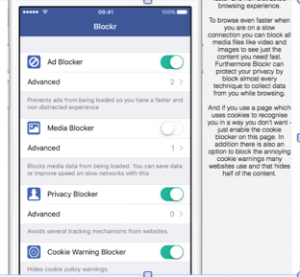“Content Blockers a Boon for Privacy” ran the headline from GigOm in a recent Daily Dashboard, but is it as simple as that?
Having dug a little deeper into the announcement last week that Apple was opening up iOS9 to content blocking apps, I quickly uncovered that apps such as Blockr that were advertised as "privacy protectors" were also offering to block the “annoying cookie warnings” required by EU laws under the e-Privacy Directive. This capability has been available for a while through ad blocker extensions such as http://prebake.eu but it seemed ironic that an app marketed as a privacy management tool would seek to remove the privacy protections required in EU law.
 As we know in the privacy profession, privacy best practices and laws are built on the pillars of Transparency, Notice and Choice. It now appears that some ad blockers, acting under a banner of privacy, are achieving exactly the opposite by removing consumer visibility into the tracking that’s taking place and consumers’ ability to chose which cookies and trackers they want to accept.
As we know in the privacy profession, privacy best practices and laws are built on the pillars of Transparency, Notice and Choice. It now appears that some ad blockers, acting under a banner of privacy, are achieving exactly the opposite by removing consumer visibility into the tracking that’s taking place and consumers’ ability to chose which cookies and trackers they want to accept.
Industry concern
So far all the media coverage has been around the damage that ad blockers could do to the advertising industry and the business model on which so many free apps and the free Internet depends. The very day after making it to the top of the Apple download charts with Peace, powered by Ghostery, its creator Marco Arment pulled the ad-blocking app from the App Store writing, “Just doesn’t feel good.” He continued:
Achieving this much success with Peace just doesn’t feel good, which I didn’t anticipate, but probably should have. Ad blockers come with an important asterisk: while they do benefit a ton of people in major ways, they also hurt some, including many who don’t deserve the hit.”
While this move does not relate to privacy and is likely testament to the extent of the concern in the ad industry over the rise of ad blockers, it is just one of the many unintended consequences of the announcement that Apple made on September 16th.
The other unintended consequence is a potential loss of online privacy protections for European consumers. And cookie notices are no longer solely a European requirement as in recent years other countries such as Brazil have also followed suit and introduced a cookie law.
What does this mean for consumers?
For consumers I’m sure this means nothing but confusion. All our research testifies to high levels of consumer concern around privacy, enflamed by revelations around government surveillance post-Snowden and fueled by frequent data breaches hitting the headlines. Forty-two percent of U.S. consumers are more worried about their online privacy than a year ago with online tracking being one of the top five causes of concern. Eighty-six percent have taken steps to protect their privacy in the last 12 months such as deleting cookies, changing privacy settings and turning off location tracking.
The advertising industry has introduced self-regulatory programs in the U.S., Canada and the EU which offer consumers choice and are developing increasing traction with companies and growing consumer awareness. But many consumers are still turning to ad-blockers with recent industry research from PageFair and Adobe showing that in the second quarter of 2015, the number of ad-blocking software users across the globe grew by 41 percent from last year, and the loss of global revenue due to blocked advertising is estimated to reach $21.8 billion this year.
While there is no shortage of data or people within the advertising industry willing to talk about the negative impacts of ad blockers, there are far fewer people talking about the introduction of cookie notice blocking extensions and filters in ad blockers. The rise of ad blockers seems to be bad for consumer privacy as well as the ad industry.
Our online experiences will all be diminished if app developers, regulators and advertisers can’t find the right balance between creativity, innovation and privacy protections.
As the Internet of Things presents a new advertising opportunity and business model, these are important issues to address. At the same time European regulators are in the throes of finalising a technology-neutral General Data Protection Regulation and stricter requirements around consent and tracking could also have unintended consequences if we see a rise in cookie notice blockers.
What’s next, an app which blocks those “annoying long privacy policies” and just lets you sign in without having to scroll through at all?































4 Comments
If you want to comment on this post, you need to login.